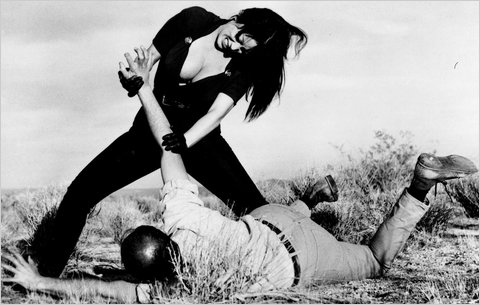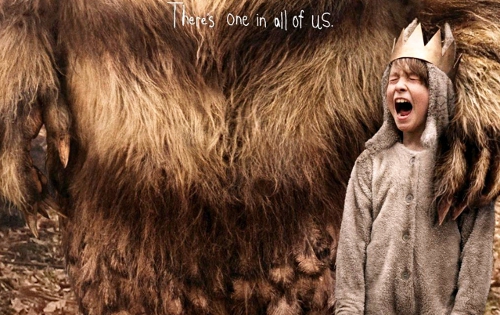 I remember seeing Hayao Miyazaki’s Spirited Away in the theatre, and I think it holds the record, in my experience, for the fastest time in making a small child cry. I have no idea what movie the child’s parents thought they were taking her to, but I don’t blame her for deciding immediately that she wasn’t going to like anything that happened in that creepy theme park.
I remember seeing Hayao Miyazaki’s Spirited Away in the theatre, and I think it holds the record, in my experience, for the fastest time in making a small child cry. I have no idea what movie the child’s parents thought they were taking her to, but I don’t blame her for deciding immediately that she wasn’t going to like anything that happened in that creepy theme park.
It seems like there are enough adult cartoons that people would grasp the concept that not all animation is for kids, but I guess packaging will always fool someone.  Hopefully no one has being paying little enough attention to let their toddler watch Happy Tree Friends, but it’s probably happened. In this case, the parents thought they were taking their little punkin to see a fun animated film, but it’s not so fun anymore when the heroine’s parents are transformed into gluttonous hogs and she’s left all alone in a haunted carnival. Cue sobbing and hasty exit stage left.
Hopefully no one has being paying little enough attention to let their toddler watch Happy Tree Friends, but it’s probably happened. In this case, the parents thought they were taking their little punkin to see a fun animated film, but it’s not so fun anymore when the heroine’s parents are transformed into gluttonous hogs and she’s left all alone in a haunted carnival. Cue sobbing and hasty exit stage left.
In a strange parallel, it reminds me of a screening of Russ Meyer’s Faster, Pussycat, Kill, Kill. A few of the men in the audience clearly realized they’d miscalculated when Tura Satana’s character went from rolling around in the dirt with a guy to snapping his neck. They thought they were going to see a movie where buxom vixens get into fights and drive fast cars, but the lecherous sniggering that had punctuated the early scenes ended abruptly, followed by the whoosh-thump of the theatre doors.
As the father of a two year old who is just realizing that television exists, I’ve been wondering how to figure out what he’ll find appealing or scary, both now and as he gets older. Of course at the moment, he might happily run off down a dark alley but be frightened by a crooked blade of grass, so my odds at working this puzzle out are probably not good. But take, for example, Lilo and Stitch. Scary. Instead, he wanted to watch a documentary series about dinosaurs which consisted almost entirely of allosauruses killing and eating other smaller allosauruses. That was fine.
Which makes me think that maybe the ways that adults define what will or will not be okay for children to watch is more about idealizing childhood than it is about reflecting the realities of what it feels like to be a child. Young kids don’t have the context to be bothered by things that might automatically seem distressing to adults, for instance death. I could not possibly make this point better than this home video of a little girl playing with a dead squirrel. Kids do, however, tend to respond strongly to musical cues, which makes intensely scored scenes in movies like Lilo and Stitch stressful even if they have no clue what is actually going on.
Most shows that test really well with toddlers seem somewhat alien to adults, presumably because they are speaking in some way to the experience of toddlerhood. Is that how the world looks to them? The toddler interest storylines make me want to gnaw my own arm off after awhile, but I’ve noticed that there are commonalities between what makes good kids programming and good adult television. I once had an interesting discussion about whether Teletubbies owe a debt to the Barbapapas, and I can’t help noticing parallels between In the Night Garden and silent movie slapstick like Charlie Chaplin and Buster Keaton. I think it’s the broad gestures, sight gags, and the belief that a well timed fall is always funny. And there’s a classic greatness to the way the adults talked in Peanuts; no real words, just that ‘mwa mwa mwa’ sound they made with a trombone and a plunger.
When it comes to older kids, in a way it gets easier to figure out what they’ll relate to because they’re closer to adulthood and therefore less alien, but it’s still easy to underestimate the ways that the shows they watch will impact their lives. I was raised on The Muppet Show, and it’s amazing how many of my values around friendship, family and the way I engage in relationships can be traced back to the Muppets. Watching The Muppet Movie now, I wonder why I wasn’t freaked out by the whole plot involving a German scientist trying to melt Kermit’s brain so that Doc Hopper could use him as a spokesfrog for a chain of restaurants that served frogs’ legs. I just wasn’t. I watched it over and over again, and “The Rainbow Connection” still captures something fundamental about my hopes and dreams.
So how can adults determine what reflects children’s experience of the world? I think the truth is that we don’t really remember. Our memories of childhood, good or bad, are blurred by time and our efforts to understand ourselves. We want the happiest, best experiences for the children in our lives, but we’re also responsible for equipping them to cope with reality, and in reality there are lots of crappy things that kids have to deal with. Like the Arcade Fire theme from Where the Wild Things Are: “Children don’t grow up, our bodies get bigger but our hearts get torn up.”
I’ve heard a lot of people say that Spike Jonze and Dave Eggers’ Where the Wild Things Are was disturbing and didn’t seem like a kids movie, but I actually came out feeling like it was unusual and important for exactly those reasons. Their portrayal of childhood is full of fierce, conflicting emotions – joy, desire, confusion, shame, disappointment, fear, the painful need to belong and be accepted – and there just aren’t many movies that are willing to show those things as a part of childhood. I don’t think that protecting kids from seeing their own negative experiences and complicated feelings reflected in tv and movies does them any favors. In my experience, it just makes them feel alone and freakish for having all the bad feelings that they have.
Being human is scary, and children need to process that as much or more than adults do.
~~~
alex MacFadyen likes animation, creepy abandoned theme parks, riot girl ultravixens, dinosaurs, little blue monsters, muppets, toddlers, and all the joy and melancholia his childhood memories have to offer.
Categories: Screen







hey alex– having been about both the incident where foolish parents had taken their toddler to Spirited Away and seen the guys fleeing Faster, Pussycat, Kill! Kill! i hadn’t thought to connect them that way. neat and interesting.
i actually wrote about the Faster, Pussycat incident for the Midnight Madness blog. i remember thinking that hearing women’s laughter during that scene probably didn’t make the fleeing men feel any more comfortable.
LikeLike
The debates people have about these things always seem funny to me. I grew up on the old Disney movies (Snow White, Sword in the Stone, etc.) and those can be very scary at times. Yet I also was raised on The Muppet Show (although it came along when I was a bit older so its impact is different) and Bugs Bunny. I agree that there’s alot of reality we shouldn’t be trying to hide from our kids. Your point about making them feel isolated because of their feelings that aren’t portrayed rings true to me. Also, when parents are saying the world is one way, but they readily see contradictions at school, etc. only undermines the parent’s credibility.
LikeLike
I loved watching Eggers’ version of WHERE THE WILD THINGS ARE. I remember thinking “This isn’t necessarily a movie for children: it’s a movie about childhood.” In other words, some of it only makes sense in retrospect, or after the acquisition of context.
Also, this “Of course at the moment, he might happily run off down a dark alley but be frightened by a crooked blade of grass” made me laugh out loud. Toddlers. So very, very funny and odd.
LikeLike
I was just reading a collection of fairy tales illustrated and retold by various comic artists and thinking the same, which now makes me wonder if it would really be good for children.
LikeLike
I think you make excellent points about the differences between adult perception and child perception of what’s scary. I know as a kid I baffled my mom by being scared of everything from Pinocchio (being eaten by the whale!) and Pippi Longstocking (I think there were pirates, something I love now). It’s useful to read this article shortly before I have a kid, it’ll remind me to let them decide what’s scary.
LikeLike
You are so right when you say: “I don’t think that protecting kids from seeing their own negative experiences and complicated feelings reflected in tv and movies does them any favors. In my experience, it just makes them feel alone and freakish for having all the bad feelings that they have.” Great article! Everyone should read it; whether parents, grownup kids, or both!
LikeLike
thanks, i’m glad the article resonated with you!
LikeLike